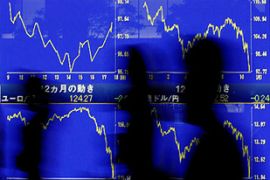Bank of Japan expected to cut rates
Central bank move would be first in seven years and follow $275bn stimulus package.

It also guarantees expanded loans and credits to small and mid-sized firms, tax-exempt housing loans to shore up the property market, and even includes the reduction of highway tolls.
“The package aims to generate solid economic growth by steady domestic demand,” Aso said.
‘Harsh storm’
He called the global financial crisis a “harsh storm seen only once in 100 years”, adding that “under such circumstances, I am certain that what is most important is to remove uncertainties from the lives of the people.”
Earlier this week Kiyohiko Nishimura, the BOJ deputy governor, said there was a risk that the worsening global market and economic conditions could affect Japan’s economy.
“Downside risks for the economy are heightening,” he told parliament. “When financial market tension is high as it is now, the most important contribution a central bank can make is to ensure stability in markets through liquidity provision.”
The rate cut is a major change in BOJ policy. Aside from pressure to co-ordinate with other central banks to address the global economic crisis, the BOJ believes that the move is necessary to rein in a soaring Japanese yen that has hurt export-dependent Japanese companies.
There has also been speculation that the BOJ may follow a rate cut with intervention in the currency markets to weaken the yen.
Stocks lower
The Nikkei stock average was down nearly three per cent in the morning session on Friday despite the expected rate cut and gains on Wall Street overnight.
Investors appeared to be taking profit after three days of strong gains, on the chance that no rate cut materialises, which would probably send shares sharply lower.
Monday is a holiday in Japan, and Japanese investors are also nervous about holding positions over an extended weekend, given recent volatile moves overseas.
Several other Asian markets were also lower on Friday, with Hong Kong’s Hang Seng down more than three per cent and China and Australia also down while share prices in South Korea and Singapore were just in positive territory.
The slide in Asia comes despite the US Dow Jones industrial average closing 2.1 per cent higher on Thursday.
A report said consumer spending fell 0.3 per cent in the July-September period while statistics on the US gross domestic product were the worst since the country’s last recession, but the numbers, though poor, were better than the market had expected, sending stocks higher.